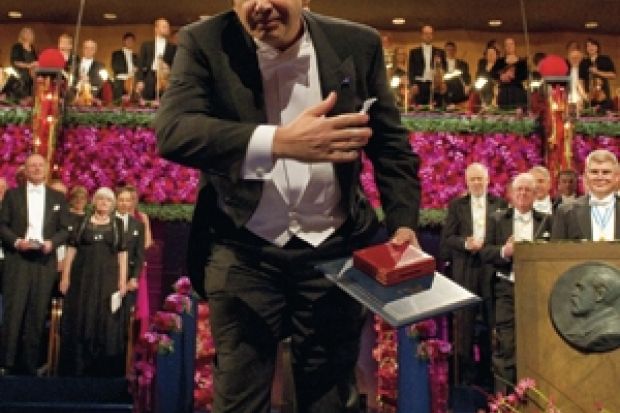The fields of econometrics, quantum physics and computational chemistry could all attract Nobel prizes next month, a citations expert has predicted.
David Pendlebury, an analyst for Thomson Reuters, has been predicting the winners of Nobel prizes in physics, chemistry, economics and physiology or medicine since 2002.
In that time he has successfully tipped 10 prizes and 17 recipients.
His method is to scour Thomson Reuters' Web of Science database for "citation laureates": researchers who have multiple papers with "stratospheric" citation counts.
He then considers whether the Nobel committee might judge their discoveries to be worthy of recognition.
Most of Mr Pendlebury's past successes have come in economics, where he has correctly predicted four prizes.
This compares with two apiece in chemistry, physics and physiology or medicine since 2002.
His economics predictions in recent years have tended to focus on topics outside the mainstream because of the damage done to the discipline's reputation by the global financial crisis.
But he told Times Higher Education that this year's choice of Douglas Diamond, professor of finance at the University of Chicago, was "not unconventional, but his research on 'intermediation' - his description of intermediaries such as banks and the role they play - is highly relevant in light of the recent crisis".
In the same category, Mr Pendlebury's decision to choose Jerry Hausman, professor of economics at the Massachusetts Institute of Technology, and Halbert White, who holds the equivalent post at the University of California, San Diego, was based in part on his observation that the Nobel Prize in Economics had not gone to the field of econometrics - the application of mathematics to economic data - in recent years.
In chemistry, his choice of Harvard University professor Martin Karplus - "for pioneering simulations of the molecular dynamics of biomolecules" - was informed by a feeling that computational and theoretical chemistry also seemed overdue for recognition.
So, too, he said, is quantum physics, for which he has repeatedly predicted prizes in recent years.
Citations, citations, citations
Of the 24 academics he has tipped for awards this year, 18 have positions at US universities.
France, with two representatives, is the only other country to figure more than once. UK institutions do not figure at all this year, despite four UK-based Nobel prizewinners being recognised in 2010.
Mr Pendlebury makes three new predictions for each prize every year, but said that those from previous years remain "live", too.
Nevertheless, he admitted, the statistical chances of success remain low.
"Depending on the field, those researchers in the top 0.1 per cent by citations number between approximately 500 and 2,000," he said.
The challenge was to find the most eminent scholars among that group, "whose research contributions conform to the dictates of Alfred Nobel's will and the judgement of the presiding committee".
He said the purpose of his predictions was to demonstrate that citations represent "another - and reliable - form of peer review, which can be quantified".
Mr Pendlebury added: "Citations have been likened to repayments of intellectual debts, so people who have accumulated such credits from their peers are often those whom these peers nominate for prizes and other honours."
His predictions, he said, were "more luck than skill, but by focusing on the most-cited scientists, we hope, as it were, to better our luck".
Register to continue
Why register?
- Registration is free and only takes a moment
- Once registered, you can read 3 articles a month
- Sign up for our newsletter
Subscribe
Or subscribe for unlimited access to:
- Unlimited access to news, views, insights & reviews
- Digital editions
- Digital access to THE’s university and college rankings analysis
Already registered or a current subscriber? Login
